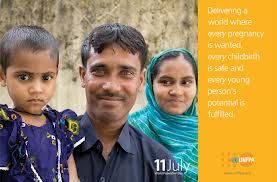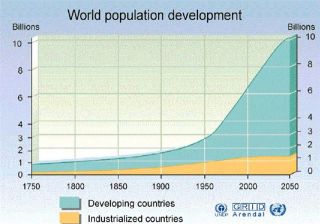
The global human population continues to increase, putting a growing strain on natural resources and ecological systems that support human life. The decision about whether to have children, and if so, how many to have, is a very personal one. However, over 200 million women worldwide who want to use contraception do not have access to adequate family planning services. Lack of access to contraceptives often results in women having more children than they would choose to have. Last month, on July 11, World Population Day, the United Nations called on global leaders to provide all women access to contraceptives.
The global population has increased from 2 billion in 1927 to 7 billion people in 2011.

About 80 million people are added to the earth each year. The current population already exceeds the earth’s carrying capacity—millions of people do not have enough food and water. Although it is hard to know what future population growth rates will be, many demographers estimate that the global population will reach 9 billion by 2050. Unless consumption of material goods and energy decreases significantly in developed countries, this increase in population will speed the rate of ecosystem destruction, eventually resulting in a poorer quality of life and decreased opportunities for most people.
Environmental effects of overpopulation include deforestation, water scarcity, food shortages, overfishing, urban sprawl, habitat loss/species extinction, increased solid waste, increased pollution of water and air, global warming resulting in climate destabilization, and more people in dense urban areas being exposed to natural disasters.
In the United States almost 50% of pregnancies are unplanned. However, access to contraceptives has been greatly improved this year with the implementation of the Affordable Care Act. In the developing world, the United States could meet its 1994 commitment made at the Cairo International Conference on Population and Development by investing $1 billion to ensure access to family planning and modern contraceptives. Another cause of unwanted pregnancies is child marriage, which increases the rate of population growth and harms women’s and children’s health. Although the teen birth rate in the United States has been declining, the United States has the highest teen birth rate in the developed world, about 40 births per 1000 women age 15-19, compared to the next highest, the UK, at about 25 per 1000 and one of the lowest, Switzerland, at about 4 per 1000. The majority of these births in the US are unplanned and could be prevented by access to factual sex education and modern methods of contraception.
People decide to have children for many reasons: emotional, psychological, cultural, religious, and instinctual. The strong instinctual drive to have children is a vestige of the need to procreate in order to preserve the human species. In today’s crowded world, this instinct no longer furthers preservation of the species. Can we, humans in the 21st century, evolve to realize that reducing our population is in the best interest of our species, as well as of plants and animals and the ecosystems that support our life?
Ecopsychology recognizes the interconnection among all beings and the concept of the ecological self—an expanded sense of self that includes the entire web of life. In this view, self-preservation is synonymous with preservation of all beings and ecosystems.


